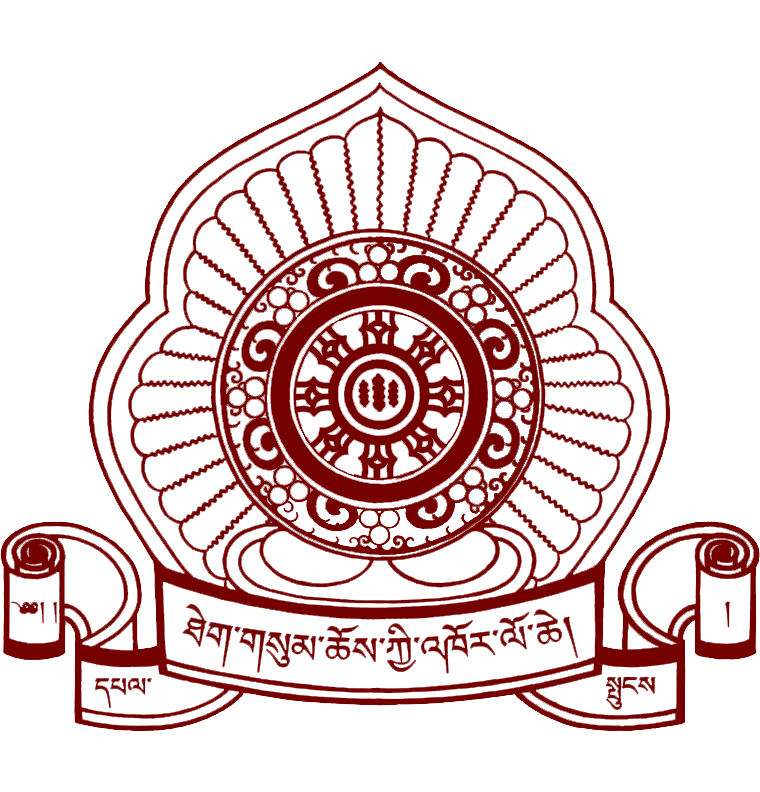About Us
Reservations at Palpung Thubten Chöling
We are delighted to announce the re-opening of the Maitreya Center of Palpung Thubten Choling as of July 1, in accordance with New York State guidelines. We welcome visitors to join us for lunch in the Maitreya dining room, and ask that you let us know in advance by emailing reservations@kagyu.com. We regret that the dining room will not be open for other meals at this time. Masks are required indoors.
Overnight accommodations will also be available as of July 1 for fully vaccinated guests only. If you would like to stay at the monastery, please make reservations in advance using the form below.
If you need assistance with making your reservation, please email reservations@kagyu.com.
If you are unwell, please stay home to rest and recover and come join us again when you are feeling better. Germs spread quickly within a community and we appreciate your concern for the health of the residents and guests of the monastery. Please review the accomodation options below.
| Type of Accommodation | Non-Member | Member |
| Dormitory not available at this time | n/a | n/a |
| Double Occupancy Room Guest House | $60 | $50 |
| Double Occupancy Room Maitreya Center | $75 | $65 |
| Single Occupancy Room Guest House | $65 | $55 |
| Single Occupancy Room Maitreya Center | $80 | $70 |
Visitors are encouraged to bring warm clothes in cool weather, appropriate shoes and/or boots, a flashlight, alarm clock, and phone card. Personal meditation cushions are only needed for large seminars. If you are planning to be outdoors, you may wish to also bring insect repellent/tick repellent, a hat and socks.
Rates: Daily rates include vegetarian lunches (i.e. one overnight stay, plus lunch). Rates do not include teachings/seminar fees, and are subject to change during special seminars.
Day Guests: For those who plan to visit for the day, the suggested donation for Lunch is $10. Please send an email to reservations@kagyu.com if you are joining us for lunch only.
Please note our lunch offering may contain common allergens including soy, wheat, tree nuts, seeds, milk, and egg products. We are sorry that we are unable to accommodate special dietary needs.
We have recently changed our accommodations payment policy. In order to better manage reservations payment will be processed via the reservations form below. Advanced notice is required if you wish to pay onsite at the beginning of your stay.
Shrine Room Rules and Etiquette
Basic Rules:
- The shrine room is open for practice from 6 a.m. until 9:30 p.m. (except during seminars when hours will be posted).
- Wear proper attire in the shrine room (i.e., no shorts, open or low cut shirts, or short skirts).
- No food or beverage is permitted in the shrine room during teachings or empowerments.
- At the start of each teaching session, perform three prostrations after Rinpoche and the Lamas are seated. When there are no Lamas in attendance, perform three prostrations along with the Umzay (chanting master).
- Maintain silence in the shrine room at all times. When it is necessary to speak, please whisper.
- Note that practitioners do not talk during Tsokpa (chanting assemblies).
- Do not step over pecha tables or place chanting texts on the floor.
Other Courtesies:
- Cushions are limited, please use only one cushion when there are many people in attendance. After the session, please return your cushion to the back of the shrine room.
- Transliterations of the opening and dedication prayers are available upon request.
- Chairs can be provided upon request. Inform the registrar if you need one.
- For more information about Tsokpa (chanting assembly), please speak with the Chöpön (person in charge of the shrine) between chanting services.
- Take all personal belongings (except chanting texts) with you after each teaching and chanting session. Personal belongings left in the shrine room will be removed to the lost and found.
- In the event that children become restless or begin to cry, parents are requested to take them downstairs, where the teachings can be heard via speakers.
Policy and Rules
- No drugs or alcohol.
- No smoking on the property.
- No candles or incense in any of the guest rooms.
- Camping by permission only.
- No pets on the property.
Local Hotels and Motels
There are a number of hotels and motels in the area. To get you started in your search, unless otherwise noted, the motels listed below are all located on Route 9 (within 10 minutes of Palpung Thubten Chöling). Prices vary. Some of these motels offer discounts to seniors, members of AAA, AARP or government employees. Please call the motel directly for rates in effect during your planned visit.
Ramada Inn:
Fishkill (845) 896-4995
Poughkeepsie (845) 462-4600
Days Inn:
(845) 454-1010
Note: 20 minutes from Palpung Thubten Chöling
Courtyard by Marriott:
Fishkill (845) 897-2400
Poughkeepsie (845) 485-6336
Courtyard by Mariot Nationwide reservations:
(800) 321-2211
Holiday Inn Express:
Poughkeepsie
(845) 473-1151
www.poughkeepsiehi.com.
Holiday Inn:
Fishkill
(845) 896-6281
Wellesley Inn:
Fishkill
(845) 896-4995
Wellesley Inn Nationwide reservations:
(800) 444-8888 Hampton Inn and Suites
Poughkeepsie
Roots and Branches of Palpung Thubten Choling Monastery
Palpung Thubten Choling Monastery, whose name means “Garden of the Buddha’s Teachings,” was founded in 1978 by Lama Norlha Rinpoche under the guidance of his root guru Kyabje Dorje Chang Kalu Rinpoche. It was named after the main Palpung monastery in Tibet, the seat of Guru Vajradhara His Holiness The Twelfth Chamgon Kenting Tai Situpa, under whose spiritual direction Palpung Thubten Choling and its affiliated centers operate as branches of the Palpung Congregation.
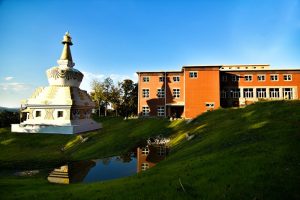
The lineage of the Kenting Tai Situpas is traced to one of the main disciples of the Buddha, the Bodhisattva Maitreya. Since that time, there has been a successive chain of incarnations, a direct lineage that continues to the present day. The Twelfth Kenting Tai Situpa is the current head of the Palpung lineage. The Twelfth Kenting Tai Situpa oversees a vast network of monasteries, retreat centers, and Dharma centers worldwide. He is also a scholar, poet, calligrapher, artist, author, architect, and geomancer. Continue reading to learn more about how our local monastery began and work today in support of the Buddhadharma.
The Beginning
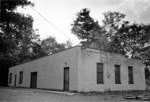 The monastery began as a simple one-story factory building on seven acres of land overlooking the Hudson River in the town of Wappingers Falls, New York, just 75 miles north of New York City. A small group of sangha members worked twelve-hour days alongside Lama Norlha Rinpoche to lay foundations and construct walls, learning the necessary skills as they went. Over the next several years, the main house was renovated and expanded, and by 1982 two retreat houses, one for men and one for women, had been completed and were ready to host the first traditional three-year retreat in North America.
The monastery began as a simple one-story factory building on seven acres of land overlooking the Hudson River in the town of Wappingers Falls, New York, just 75 miles north of New York City. A small group of sangha members worked twelve-hour days alongside Lama Norlha Rinpoche to lay foundations and construct walls, learning the necessary skills as they went. Over the next several years, the main house was renovated and expanded, and by 1982 two retreat houses, one for men and one for women, had been completed and were ready to host the first traditional three-year retreat in North America.
Decades of Distinguished Teaching
Since 1980, we have been immensely fortunate to welcome a number of great lamas and spiritual heads of all traditions of Tibetan Buddhism, who have visited, blessed, and given teachings and empowerments at PTC. In addition to many visits from our spiritual director Guru Vajradhara His Holiness Chamgon Kenting Tai Situpa, PTC has also hosted His Holiness the Fourteenth Dalai Lama; both the 16th and 17th Gyalwang Karmapas; Kyabje Dorje Chang Kalu Rinpoche and his successor, the current Kalu Rinpoche; Jamgon Kongtrul Rinpoche III; Gyaltsap Rinpoche; Yongey Mingyur Rinpoche; Khenpo Tsultrim Gyamtso Rinpoche; Khenchen Thrangu Rinpoche; Dilgo Khyentse Rinpoche; Sakya Trizin Rinpoche, and Ringu Tulku Rinpoche.
Lamas In Residence
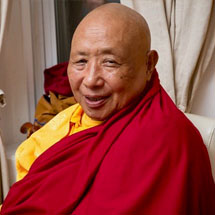 Our founding abbot, Lama Norlha Rinpoche, passed away in 2018 after a long illness. Our current resident lamas, from Sherabling Monastery in India, are Lama Tsering, who serves as three-year retreat master, and Lama Norgyal, who was one of the principal chant leaders at Sherabling and is now the resident lama of Palpung Thubten Choling. A number of resident monastics and lay practitioners, including several three-year retreat graduates, lead programs and see to the day to day running of the monastery.
Our founding abbot, Lama Norlha Rinpoche, passed away in 2018 after a long illness. Our current resident lamas, from Sherabling Monastery in India, are Lama Tsering, who serves as three-year retreat master, and Lama Norgyal, who was one of the principal chant leaders at Sherabling and is now the resident lama of Palpung Thubten Choling. A number of resident monastics and lay practitioners, including several three-year retreat graduates, lead programs and see to the day to day running of the monastery.
Programs for the Public
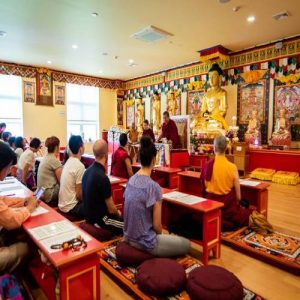 PTC also serves as an active dharma community and meditation center with both local and worldwide reach, providing opportunities for students at all levels. For more than two decades our teaching staff has offered an Introduction to Buddhist Meditation on Monday evenings, and over the past decade many local students have participated in a Tuesday evening study group to discuss the foundational texts of Tibetan Buddhism. To date we’ve completed The Jewel Ornament of Precious Liberation (with commentary Path to Buddhahood), The Great Path of Awakening, The 37 Practices of a Bodhisattva and Tai Situ Rinpoche’s Awakening the Sleeping Buddha. Currently the group is reviewing the new translation of Gampopa’s Ornament of Precious Liberation. All weekly programs are being offered in person and on Zoom, free of charge. Details about these programs as well as special teachings and chanting events can also be found on our event calendar. If you would like to participate remotely, please use our online event registration form.
PTC also serves as an active dharma community and meditation center with both local and worldwide reach, providing opportunities for students at all levels. For more than two decades our teaching staff has offered an Introduction to Buddhist Meditation on Monday evenings, and over the past decade many local students have participated in a Tuesday evening study group to discuss the foundational texts of Tibetan Buddhism. To date we’ve completed The Jewel Ornament of Precious Liberation (with commentary Path to Buddhahood), The Great Path of Awakening, The 37 Practices of a Bodhisattva and Tai Situ Rinpoche’s Awakening the Sleeping Buddha. Currently the group is reviewing the new translation of Gampopa’s Ornament of Precious Liberation. All weekly programs are being offered in person and on Zoom, free of charge. Details about these programs as well as special teachings and chanting events can also be found on our event calendar. If you would like to participate remotely, please use our online event registration form.
Customary Practices and Rituals
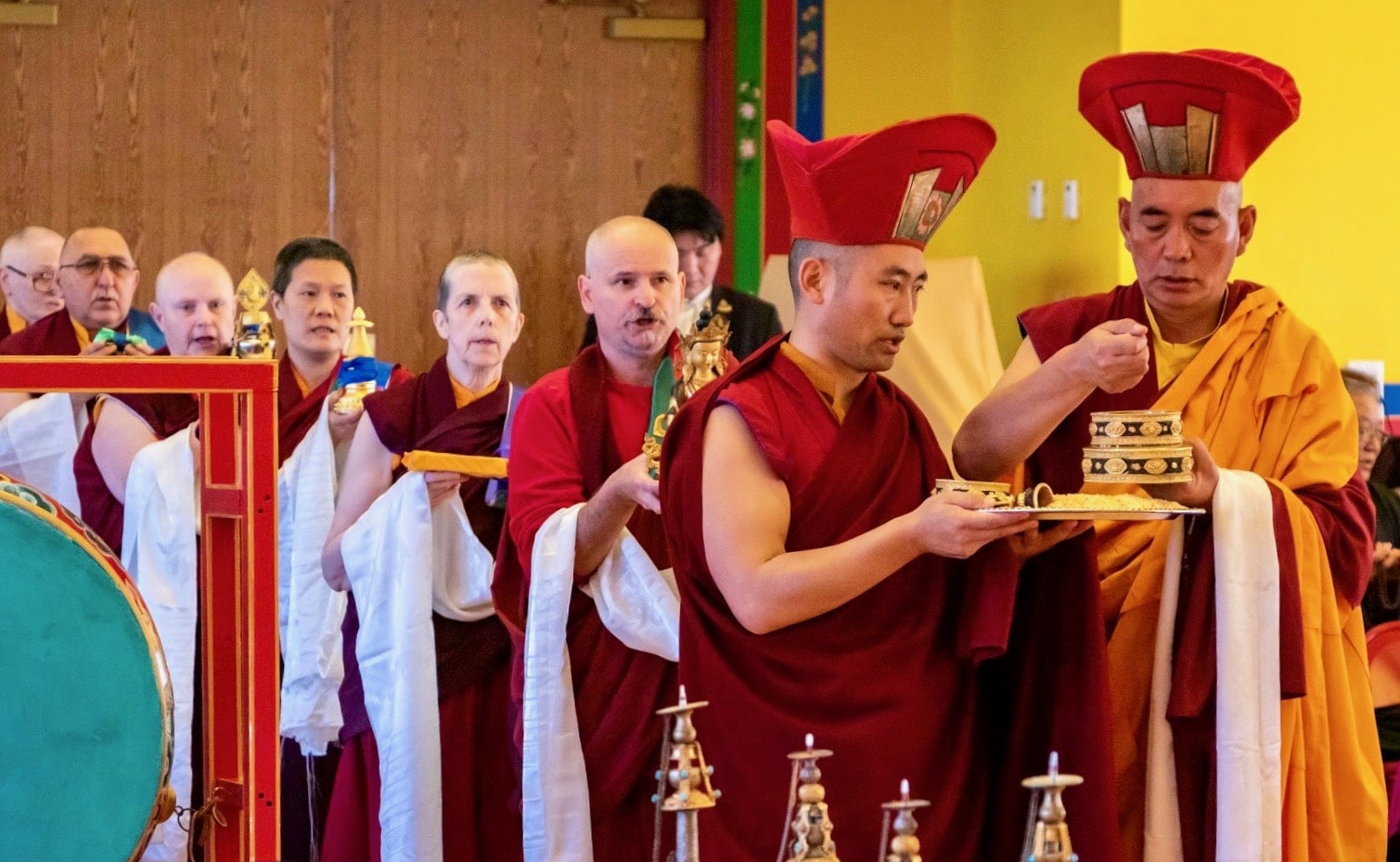 Palpung Thubten Choling maintains the traditional practices, rituals, and customs of the Kagyu Lineage. Daily practices, called tsokpas, with their accompanying rituals, are chanted in the shrine rooms and retreat houses in Tibetan. Monthly practices, such as Dorje Pagmo, Guru Rinpoche and the dharma protector Gonpo Bernachen are conducted on the appropriate days of the Tibetan lunar month, accompanied by music played on traditional Tibetan instruments – cymbals, drums, long horns, and reed horns. Twice a year residents and visitors perform the traditional dokpa practices to remove obstacles and invite auspicious conditions, including the three-day practice of Tara Yuldok, and Sherab Nyingpo, an elaborate, day-long version of the Heart Sutra. Several times a year, especially at Saka Dawa in the spring and Lhabap Duchen in the fall, residents and visitors participate in the nyungne fasting practice of Thousand-Armed Chenrezig, lasting from two to 16 days. And, of course, every year the festivities of the Tibetan New Year, Losar, are observed according to the Tibetan lunar calendar, with the date generally ranging from late January to early March.
Palpung Thubten Choling maintains the traditional practices, rituals, and customs of the Kagyu Lineage. Daily practices, called tsokpas, with their accompanying rituals, are chanted in the shrine rooms and retreat houses in Tibetan. Monthly practices, such as Dorje Pagmo, Guru Rinpoche and the dharma protector Gonpo Bernachen are conducted on the appropriate days of the Tibetan lunar month, accompanied by music played on traditional Tibetan instruments – cymbals, drums, long horns, and reed horns. Twice a year residents and visitors perform the traditional dokpa practices to remove obstacles and invite auspicious conditions, including the three-day practice of Tara Yuldok, and Sherab Nyingpo, an elaborate, day-long version of the Heart Sutra. Several times a year, especially at Saka Dawa in the spring and Lhabap Duchen in the fall, residents and visitors participate in the nyungne fasting practice of Thousand-Armed Chenrezig, lasting from two to 16 days. And, of course, every year the festivities of the Tibetan New Year, Losar, are observed according to the Tibetan lunar calendar, with the date generally ranging from late January to early March.
Buildings and Grounds
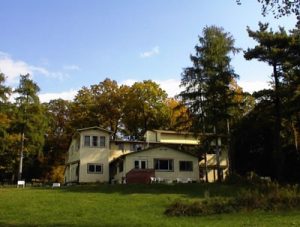 From its beginning as a one-story factory building in the 1970s, PTC has grown continuously into the fully functioning Tibetan Buddhist monastery it is today. The first physical expansions, in the late 1970s and early 1980s, were the construction of the two three-year retreat houses that are still in use 40 years later, and the addition of a second story to house the original shrine room. Later the original building was further expanded to include a spacious dining room and additional rooms at the front of the house, which are now the library and resident housing. The Enlightenment Stupa for World Peace was constructed in the 1990s, and our new main monastery building, the Maitreya Center, with its vast Maitreya Shrine Hall, was competed in 2016. We had the honor of hosting the 2016 North American Kagyu Monlam in the Maitreya Center, graced with the presence of Yongey Mingyur Rinpoche as the presiding host.
From its beginning as a one-story factory building in the 1970s, PTC has grown continuously into the fully functioning Tibetan Buddhist monastery it is today. The first physical expansions, in the late 1970s and early 1980s, were the construction of the two three-year retreat houses that are still in use 40 years later, and the addition of a second story to house the original shrine room. Later the original building was further expanded to include a spacious dining room and additional rooms at the front of the house, which are now the library and resident housing. The Enlightenment Stupa for World Peace was constructed in the 1990s, and our new main monastery building, the Maitreya Center, with its vast Maitreya Shrine Hall, was competed in 2016. We had the honor of hosting the 2016 North American Kagyu Monlam in the Maitreya Center, graced with the presence of Yongey Mingyur Rinpoche as the presiding host.
The Three-year Retreat Program
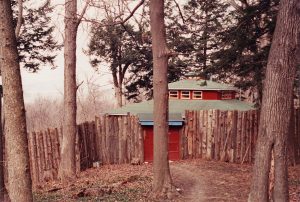 The three-year, cloistered seminary retreat program to train serious students in the core teachings and practices of the Kagyu Lineage, has been a major focus of Palpung Thubten Choling since its founding in 1982. Ten cycles of retreat have been completed to date.
The three-year, cloistered seminary retreat program to train serious students in the core teachings and practices of the Kagyu Lineage, has been a major focus of Palpung Thubten Choling since its founding in 1982. Ten cycles of retreat have been completed to date.
Three-year retreat graduates offer instruction in meditation, traditional rituals, and Tibetan language at the monastery and its affiliated centers located throughout the Eastern United States. They also serve as mentors in the Dharma Path Program.
The Dharma Path Program
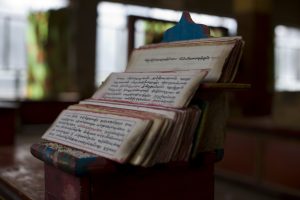 A pioneering online Dharma curriculum, the Palpung Thubten Choling Dharma Path program was created in 2006 under the direct guidance of Lama Norlha Rinpoche to meet the needs of serious meditation practitioners who do not have the circumstances to participate in the traditional three-year retreat. Designed to provide an opportunity for significant personal development in the basic meditation practices and contemplation techniques of the Kagyu Lineage of Tibetan Buddhism, the Dharma Path program serves as an in-depth curriculum for lay practitioners as well as an excellent preparation for dharma students who aspire to do a three-year retreat.
A pioneering online Dharma curriculum, the Palpung Thubten Choling Dharma Path program was created in 2006 under the direct guidance of Lama Norlha Rinpoche to meet the needs of serious meditation practitioners who do not have the circumstances to participate in the traditional three-year retreat. Designed to provide an opportunity for significant personal development in the basic meditation practices and contemplation techniques of the Kagyu Lineage of Tibetan Buddhism, the Dharma Path program serves as an in-depth curriculum for lay practitioners as well as an excellent preparation for dharma students who aspire to do a three-year retreat.

